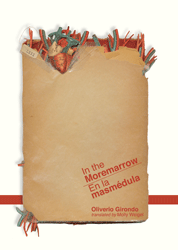In the Moremarrow / En la masmédula by Oliverio Girondo
 In the Moremarrow / En la masmédula
In the Moremarrow / En la masmédula
by Oliverio Girondo, translated by Molly Weigel
Action Books, 2013
93 pages / $16 Buy from Action Books or SPD
the mix
yes
the mix I stuck my bridges together with
That first line is beautiful & on one level it seems a sort of how-I-wrote-my-book-and-so-can-you! treatise by Girondo. They are the last 4 lines of In the Moremarrow‘s first poem, The Mix
A dovetail is a joint formed by two pieces whose respective notches are made one for the other, in alternating fashion, so they conveniently fit. Here, the dovetails are undone, & instead we have for example soulmortar, an unlikely union of the ethereal intangible but vital, with the crushed inert material. Which, in creation myths, sounds like the soul blown into dust to animate a person. Perhaps, then, this is not so foreign. It is more primordial marrow. The mix seems to refer, then, to this poetics of uniting the disjointed, of mending broken ligaments, & the “bridges” are the compound words themselves, the neologistic portmanteaus
It is hard to say what stubborn female couplings refers to. Maybe something about the male poet accepting his anima, that female part of him that is stubbornly there but his machismo stubbornly rejects. This is a reach, as psychoanalysis is a reach. The “ex-she” seems to support it, & the several later poems’ repeated references to the ego seem to support it, & the erotics of “the mix” seem to support it, but it still feels like conjecture
Every left page gives the original Spanish version of the poem, and the right page holds the translation. I notice the Spanish helps. The original version of that first line is two
la pura impura mezcla que me merma los machimbres el almamasa tensa las tercas
hembras tuercas
English grammar now is largely gender-neutral, and Spanish grammar isn’t. Every noun & adjective in this sentence is female (ending in -a or -as) except for two. On a macro level we at least can say that “female couplings” refers to the writing itself. The writing is self-referential. The universe of En la masmédula writes its own rules & thereby writes itself into existence. Perhaps this explains its lack of proper nouns; on one level, it has no need to tie itself to the World as we know it, it needn’t be referential, it loves itself into being, it is self-reverential. It ties itself to the Word. It hermetically seals itself
But on another level, no. It hermaphroditically seals itself
Because it rewrites itself by correcting the mistakes of our World. The mistakes of our World embed themselves inside the grammar that we use, those stubborn couplings that lead us towards fixed fragmentations, binary perspectives, formal & social discriminations. Therefore the recombinations in this book are all still legible, because they adhere to grammar rules but comment on them while deforming them. “alma” for example means soul. It is one of those strange nouns with a feminine ending (alma), but is nevertheless considered a masculine noun, hence the male article “el.” Combining “alma” with the feminine noun “masa,” however, creates a Word of indeterminate gender, but the “el” still precedes it. This seems a problematization. “masa,” in fact, means flour, it is the baseline substance for sweet sumptuous cakes, for savory bread of the Earth, etc.
“machimbres” isn’t a word. It reminds of the word “machismo,” a word English has imported, & of the word “chimba” which can mean the opposite bank of a river, or a pigtail, or a piece of meat, etc. It also sounds like “machihembrado,” a dovetail joint, hence Weigel’s translation choice. It seems again though that this dovetail has been pared down, to remind us of all its assemblage, & question gender once again. To undo the dovetails, quite literally. A beautiful translation choice. It bridges shores. The shores Girondo sticks his bridges with
Translation is hard.
*
solicroak
prefugues
sighspirits
selfsoundings
inlabyrinth
ex-she’s
soulmortar
*
A lot of poems end on their own titles, creating a feeling of being in an enclosure. This is a bizarre feeling, because the poems are intensely lyrical without being confessional or “sincere” or narrative in the way the Lyric I often attempts to be; instead it is like handling a ball of pure psychic energy. The poem entitled “You have to look for it” has three stanzas, each of which ends on “for the poem,” which inscribes itself within the title’s “it.” The first line of the poem goes
In the eropsychis full of guests then meanders of waiting absence
Which is, like, incredible. But once again, very gestural. It once again informs the readers of the poem’s motive & the poem’s dimensions. It is a meeting place, a delimited house, a hovel of guests, entering the poet’s eroticized ego; it couples. There are other people there, straying, erranding
January 31st, 2014 / 10:00 am
